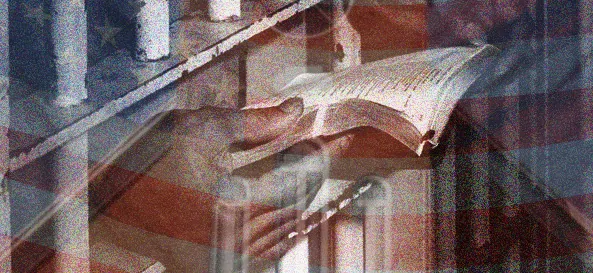It is easy to be disillusioned by the polarized state of our public square today, and by the shameful witness of many self-identified Christians in politics. But I believe that now more than ever we need faithful Christians to step up and engage in our political system, not just from the outside but from the inside as well.
For twelve unforgettable months in 2010, I was given an unlikely opportunity to do just that: to live out my faith by running for U.S. Congress. As the next election cycle heats up, I offer this story as a testimony to the good that can still come from engaging our broken political system as followers of Jesus Christ.
In 2010, I turned twenty-five years old and had recently published a book showcasing how Christians in my generation are caring for the planet. I was also co-leading a Christian environmental organization that was expanding its work nationwide. Between the new book and the start-up nonprofit, I was busy traveling around America speaking, writing, organizing and advocating. Life was full and I was on a roll.
But I was also becoming increasingly fed up.
I was fed up with the broken state of politics in America; with the corruption, the dishonest rhetoric, the special interest money and the partisan gridlock that so often characterizes our diseased political culture. I was fed up with irresponsible politicians intent on serving their own interests (and re-election campaigns) instead of the common good.
Beyond all this, however, I was fed up with the broken public witness of American Christianity amidst our national mess. I was deeply troubled by our pervasive cultural accommodation, the skewed political track-record of the religious right and our obsession with a few key social issues at the expense of many other biblical priorities. And I was sick of the way our faith was being so shamelessly manipulated and abused for political ends by leaders on both the right and left.
The church has a powerful opportunity today—really a divine responsibility— to be salt and light in a dark and decaying political culture. But we are failing. As the late John Stott warned, “We should not ask ‘What is wrong with the world?’ for that diagnosis has already been given. Rather, we should ask, ‘What has happened to the salt and light?’” Or, as many of us have been asking, is it even possible to be salt and light in the public square today, and be taken seriously, without compromising our faith in the process? This is the question I was determined to answer when I agreed to run against the incumbent in my congressional district.
I had never planned to run for elected office and was far from being a typical or ideal candidate, but I was fed up enough, for long enough, that I was ready to take a stand. And while the incumbent was also an evangelical, many of us in the district were increasingly disillusioned by his polarizing rhetoric, his partisan record, his lack of constructive action on many pressing social needs, and his indebtedness to special interests and PACs. This only further compelled me to action.
And so began the hardest challenge of my life to-date. For starters, members of my own party tried to pressure me off the ballot because I refused to tow the party line on all issues. Pro-choice Democrats disparaged me as a “women-hater” for being pro-life; pro-life Christians called me a “baby-killer” for running as a Democrat. Conservatives questioned the sincerity of my faith because I ran on the Democratic ticket and progressives criticized me for being “too religious.” Both sides ridiculed me for my youth and relative inexperience. I was largely dismissed by the press and passed over for endorsements (even by environmental groups that I had long worked with) for my lack of funding and my largely volunteer campaign staff. I had doors slammed in my face, obscenities yelled at me, false rumors spread about my positions and angry letters and emails sent by people I had never even met. It was a hard season.
At the same time, it was one of the most meaningful and encouraging times of my life. I had the privilege of meeting the kindest people and hearing their humbling stories of resilience and hope. Over time our base of support blossomed to include an inspiring mosaic of not only Democrats, but also Independents, Greens and even Republicans. Young adults mobilized enthusiastically and volunteered long hours in all kinds of weather to get the word out. Our district includes respected evangelical institutions, such as Wheaton College and Christianity Today, and evangelical leaders began to back me, some commenting that I was the first Democrat they had supported in years. Progressives who had shunned me in the beginning ended up donating generously and helped distribute thousands of campaign stickers and yard signs across the district (we had lots of fun with the campaign slogan based on my last name: Aim High, Vote Lowe). And I even got to witness hearts and minds open up to understanding Jesus in a renewed light—with some people even coming to faith. It was a blessed season.
It was also an eye-opening experience. I observed the corrupting power of money in politics, and the compromises required to pay back the millions of dollars donated by PACs and lobbies, in order to fund a competitive national campaign. I felt first-hand the incredible pressures to fight dirty and tear down the competition—or stay silent when others did so—in order to get ahead. But the ends do not justify the means; we must strive to be above reproach in both. It is meaningless to hold the right positions if we go about fighting for them in the wrong ways.
In a culture nurtured on a steady diet of fear—fear of illegal aliens, fear of homosexuals, fear of Muslims, fear of socialism, etc.—being a faithful witness involves overcoming, not manipulating, our prejudices so we are freed to engage all people and situations with grace and truth.
I learned that it still is possible to break out of the old socio-political boxes and transcend the culture wars to build bridges for the common good. Neither party has a monopoly on biblical values. It is time we become less partisan and more biblical. The same Bible and the same Savior that call us to protect the unborn, call us also to care for the poor, the widow, the oppressed, the immigrant, the sick, the jobless, the victims of war and for all God’s creation.
Though I lost the election with 36.7% of the vote, our campaign gained a measure of respect from all sides, and I learned that it is possible for Christians to be effective salt and light without compromising their faith. We do not need to remain passive, fed up with the broken state of politics today; we can be part of changing it. But ultimately, we will not change the status quo by compromising in order to win elections; we will change it by remaining faithful, whether we win or lose.
As Christians, we affirm the sovereignty of God over all things, including elections, politics, governments, and the future. Our faith releases us from the compulsive drive to succeed and the corrupting fear of losing, and empowers us to do the right thing no matter what the cost. It is about the freedom of faithfulness rather than the necessity of success. Pursuing victory at all cost points people to ourselves; pursuing faithfulness at all cost points people to Christ.
Faithfulness will not always win elections, but it fulfills the call of God, and is the only way we can truly reflect the light of Jesus in a world of darkness.






















